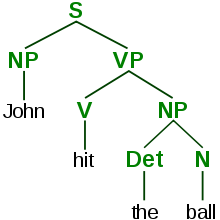Etymology/Quiz
< Etymology
 |
Completion status: Ready for testing by learners and teachers. Please begin! |
Etymology is an introductory lecture for the course on the elements of terminology.
 |
Development status: this resource is experimental in nature. |
This quiz covers the Wikiversity.
 |
Educational level: this is a primary education resource. |
You are free to take it at any time.
 |
Educational level: this is a secondary education resource. |
Once you’ve read and studied these pages and the links contained within and listed under See also, you should have adequate background to take the quiz.
 |
Educational level: this is a tertiary (university) resource. |
Enjoy learning by doing!
 |
Educational level: this is a research resource. |
 |
Resource type: this resource is a quiz. |
 |
Subject classification: this is a linguistics resource. |
 |
Subject classification: this is a semantics resource. |
 |
Subject classification: this is a terminology resource. |
Quiz
External links
| Charge ontology |
|---|
| | Lectures | | | | Articles | | | | Courses | | | | Activities | | | | Lessons |
| | | Problem sets | | | | Quizzes | | | | Lists | | | | Projects | | | | Topics |
Astronomy ·
Astrophysics ·
Geophysics ·
Nuclear physics ·
Particle physics ·
Planetary science
|
|
| Reasoning |
|---|
| | Lectures | | | | Articles | | | | Courses | | | | Topics | | | | Schools |
Biomathematics ·
Computer Science ·
Law ·
Linguistics ·
Mathematics ·
Philosophy ·
Psychology
| | | Activities |
| | | Lessons | | | | Quizzes |
Abstract concept generator/Quiz ·
Affirmation/Quiz ·
Answer/Quiz ·
Argumentation/Quiz ·
Assent/Quiz ·
Belief/Quiz ·
Canons/Quiz ·
Categorical Syllogism/Quiz ·
Certainty/Quiz ·
Comparison/Quiz ·
Computer Logic/Quiz ·
Conclusion/Quiz ·
Correctness/Quiz ·
Credulity/Quiz ·
Criteria/Quiz ·
Deduction/Quiz ·
Demonstration/Quiz ·
Discovery/Quiz ·
Discrimination/Quiz ·
Disillusionment/Quiz ·
Dissent/Quiz ·
Eccentricity/Quiz ·
Elementary logic/Quiz ·
Error/Quiz ·
Evidence/Quiz ·
Evolution/Quiz ·
Experiment/Quiz ·
Fact/Quiz ·
Foolishness/Quiz ·
Formalness/Quiz ·
Gamble/Quiz ·
Hypothesis/Quiz ·
Idea/Quiz ·
Ignorance/Quiz ·
Illusion/Quiz ·
Impossibility/Quiz ·
Improbability/Quiz ·
Incredulity/Quiz ·
Indiscrimination/Quiz ·
Induction/Quiz ·
Inference/Quiz ·
Insanity/Quiz ·
Intellect/Quiz ·
Intuition/Quiz ·
Judgment/Quiz ·
Knowledge/Quiz ·
Logic/Quiz ·
Mathematical proofing & reasoning/Quiz ·
Maxim/Quiz ·
Measurement/Quiz ·
Metalogic/Quiz ·
Metamathematics/Quiz ·
Misjudgment/Quiz ·
Negation/Quiz ·
Normative/Quiz ·
Overestimation/Quiz ·
Philosophical logic/Quiz ·
Philosophy/Quiz ·
Possibility/Quiz ·
Prejudgment/Quiz ·
Premise/Quiz ·
Primary mathematics:Boolean logic/Quiz ·
Principle/Quiz ·
Probability/Quiz ·
Proof/Quiz ·
Proposition/Quiz ·
Propositional logic/Quiz ·
Qualification/Quiz ·
Reasoning/Quiz ·
Sanity/Quiz ·
Semantics/Quiz ·
Solution/Quiz ·
Sophistry/Quiz ·
Theoretical astronomy/Quiz ·
Theoretical radiation astronomy/Quiz ·
Theory/Quiz ·
Theory of original research/Quiz ·
Thought/Quiz ·
Topic/Quiz ·
Truth/Quiz ·
Unbelief/Quiz ·
Uncertainty/Quiz ·
Underestimation/Quiz ·
Validity/Quiz
| | | Original research | | | | Proposal |
| | | History | | | | Projects |
| | | Glossaries | | | | Portals |
Portal:Computer Science ·
Portal:Mathematics
|
|
| Semantics resources |
|---|
| | Lectures | | | | Articles | | | | Courses | | | | Activities | | | | Lessons | | | | Problem sets |
| | | Quizzes | | | | Lists | | | | Projects | | | | Topics |
Computational linguistics ·
Computer programming ·
Foreign Language Learning
| | | Schools |
Computer science ·
Language and literature ·
Linguistics ·
Media Studies
| | | Fields | | | | Proposals | |
|
 This is a research project at http://en.wikiversity.org
This is a research project at http://en.wikiversity.org
![]() This is a research project at http://en.wikiversity.org
This is a research project at http://en.wikiversity.org